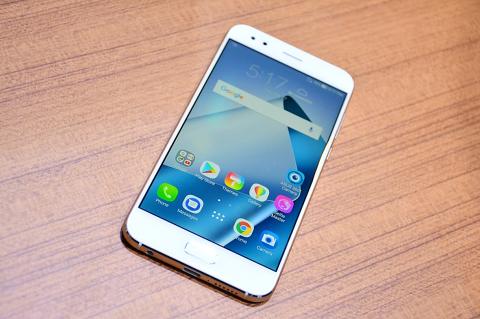A new Ministry of Education (MOE) survey published on Sept. 15 has found that approximately 30 percent of junior and senior high school students spend too much time on their smartphones.
According to Chou Chien, a professor at National Chiao Tung University’s Institute of Education who was commissioned to conduct the survey on behalf of the MOE, the upper years of elementary school and into junior high school are the most critical periods when students can develop the tendency to spend too much time on phones. In the lower years of elementary school, parents are still able to exert control over the students, but in the upper years these students are more likely to be allowed to own a smartphone.
Generally speaking, junior high and senior high school students, who are entering adolescence, tend to be more defiant and start to rebel against their parents. Chou’s study shows that parents can restrict what their kids do when they are elementary school students, but after they enter junior high school this approach no longer works, and parents have to change to a more active intervention approach. Where parents could previously restrict their kids, they now have to be more tactful and diplomatic, so that their children do not feel as if they are being restricted, which should make them less likely to resist.

Photo: Tan Wei-cheng, Liberty Times
照片:自由時報記者譚偉晟
Chou says that the most important thing is for parents to lead by example if they want to prevent their kids from getting addicted to their smartphones. For example, they can decide together rules for when the phones can be used, and the devices should be set aside during meal times. Parents should demonstrate respect for their child’s opinions and be willing to discuss the issue, instead of taking a more authoritarian, lecturing approach, says Chou.
(CNA, translated by Paul Cooper)
教育部十五日公布最新研究報告指出,台灣國中、高中學生,約三成沉迷於智慧型手機。
受教育部委託調查的交通大學教育研究所教授周倩表示,國小高年級到國中,是學生最容易陷入沉迷的關鍵階段。主要是國小低年級學生較容易受到家長管制, 而高年級起較容易被允許擁有手機。
一般而言,進入青春期的國、高中生,也比較叛逆 ,開始會反抗家長;周倩研究指出,國小學生可以採用「限制型」管理,但進入國中後,「限制型」就沒用了,必須改採「主動介入型」,家長的管制必須轉為委婉,盡量讓孩子不要明顯感受到,以降低排斥感。
周倩表示,要避免孩子沉迷手機,一大關鍵是家長必須以身作則,雙方可以一起訂定使用守則,例如約定使用時間、吃飯時間不能玩等,家長應以尊重、討論的方式,取代威權和教誨。
(中央社)

In an effort to fight phone scams, British mobile phone company O2 has introduced Daisy, an AI designed to engage phone con artists in time-wasting conversations. Daisy is portrayed as a kindly British granny, exploiting scammers’ tendency to target the elderly. Her voice, based on a real grandmother’s for authenticity, adds to her credibility in the role. “O2” has distributed several dedicated phone numbers online to direct scammers to Daisy instead of actual customers. When Daisy receives a call, she translates the scammers’ spoken words into text and then responds to them accordingly through a text-to-speech system. Remarkably, Daisy

Bilingual Story is a fictionalized account. 雙語故事部分內容純屬虛構。 Emma had reviewed 41 resumes that morning. While the ATS screened out 288 unqualified, she screened for AI slop. She could spot it a mile away. She muttered AI buzzwords like curses under her breath. “Team player.” “Results-driven.” “Stakeholder alignment.” “Leveraging core competencies.” Each resume reeked of AI modeling: a cemetery of cliches, tombstones of personality. AI wasn’t just changing hiring. It was draining the humanity from it. Then she found it: a plain PDF cover letter. No template. No design flourishes. The first line read: “I once tried to automate my

Every May 1, Hawaii comes alive with Lei Day, a festival celebrating the rich culture and spirit of the islands. Initiated in 1927 by the poet Don Blanding, Lei Day began as a tribute to the Hawaiian custom of making and wearing leis. The idea was quickly adopted and officially recognized as a holiday in 1929, and leis have since become a symbol of local pride and cultural preservation. In Hawaiian culture, leis are more than decorative garlands made from flowers, shells or feathers. For Hawaiians, giving a lei is as natural as saying “aloha.” It shows love and

1. 他走出門,左右看一下,就過了馬路。 ˇ He walked outside, looked left and right, and crossed the road. χ He walked outside and looked left and right, crossed the road. 註︰並列連接詞 and 在這句中連接三個述語。一般的結構是 x, y, and z。x and y and z 是加強語氣的結構,x and y, z 則不可以。 2. 他們知道自己的弱點以及如何趕上其他競爭者。 ˇ They saw where their weak points lay and how they could catch up with the other competitors. χ They saw where their weak points lay and how to catch up with the other competitors. 註:and 一般連接同等成分,結構相等的單詞、片語或子句。誤句中 and 的前面是子句,後面是不定詞片語,不能用 and 連接,必須把不定詞片語改為子句,and 前後的結構才相等。 3. 她坐上計程車,直接到機場。 ˇ She took a cab, which took her straight to the airport. ˇ She took a cab and it took her straight